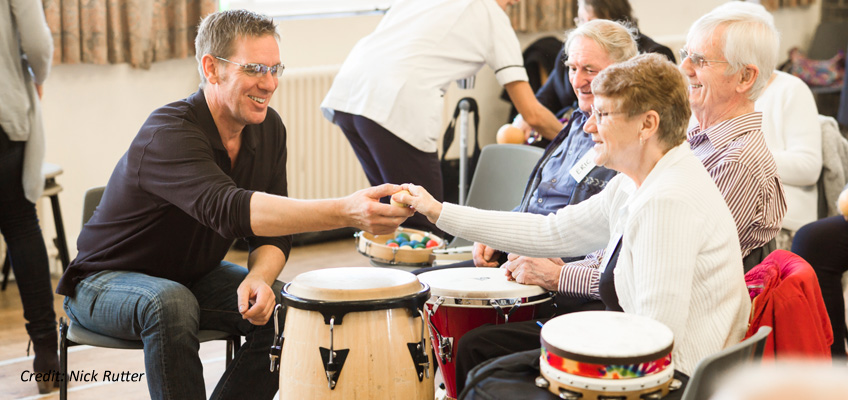It was a shock for everyone, back in 1763, when a young Swedish man, who had suffered brain damage and lost the ability to speak, went to church and found that he was able to sing hymns.
Much later, scientists made some key discoveries: that music can tap into the healthy right side of the brain to stimulate the damaged left side; that it can benefit patients who have suffered from Parkinson’s, cerebral palsy, brain damage and stroke. During World War II, music was used on an unprecedented scale as an aid to soldiers who had returned from fighting with brain damage. And the scientific advances continue to gather pace.
That’s where STROKESTRA fits in. Developed by the Royal Philharmonic Orchestra and Hull Integrated Community Stroke Service (part of Humber NHS Foundation Trust), the five-month pilot programme used creative group music-making to help recovery in stroke patients.
‘In a nutshell, we sat in a room together and jammed, mostly on percussion,’ says Fraser Gordon, Contrabassoon in the Royal Philharmonic Orchestra; a musician who was involved in the project. Patients chose individualised goals, and then were given homework to do between workshop sessions, culminating in a performance day.
All of which may sound daunting, but no prior musical knowledge was required. Instruments and musical techniques were adapted to individuals’ needs and professional musicians and clinicians were on hand to physically assist those with next to no mobility.
The patients seemed to love it: one has begun making cellos, and another has gone on to acquire an electric guitar, ‘because the acoustic guitar we gave him clearly wasn’t good enough for him,’ wryly comments Lisa Rodio, the RPO’s Project Manager for STROKESTRA. A third patient has gone down a slightly different route: having initially refused to participate in STROKESTRA’s activities, he eventually relented, and, following a few workshop sessions, has been able to return to his former passion: practising calligraphy.
Luckily the statistics tell a similarly encouraging story. Following the workshops, 86% of participants reported relief of disability symptoms, citing improved sleeping, reduced anxiety, fewer dizzy spells and reduced epilepsy symptoms. Meanwhile 71% experienced physical improvements, such as increased mobility and hand use. Perhaps most strikingly, 91% of patients reported social benefits such as improved relationships and communication.
The question is, what’s next? The Royal Philharmonic Orchestra is currently seeking funding for a three-year programme to reach up to 300 stroke survivors and carers across the country. But the difficulty, as Rodio points out, is that ‘some benefits of the course are impossible to measure in terms of economic benefits: friendships developing within the group, for example, and the knock-on effects of lifting depression.’
That said, it is exactly some of those immeasurable benefits which most inspire Rodio and, for that matter, all the professional musicians involved with STROKESTRA. ‘The social aspects of the projects definitely extend to us,’ says Gordon. ‘In fact, some of my colleagues are trying to elbow us out of the way in order to be involved. I’ve done a lot of education work for the RPO, but I’ve never come across anything quite as gripping as this.’
Written by Hannah Nepil

